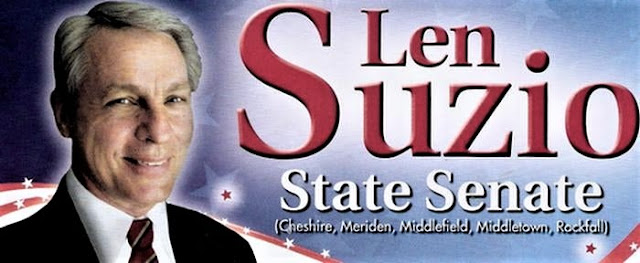The recent effective resistance to tolls, a new revenue
stream for the state, arose largely because those who pay taxes in perhaps the
most progressive state in New England had reached a limit. There is a limit to
all good things, even taxes. And, feeling the toll tax bit in their mouths,
those from whom taxes in Connecticut are collected began to express their
dissatisfaction by moving away from a burdensome load of pain.
Consequently, total revenues in the state declined. And
everyone knew this, including progressives calling for higher taxes on those in
Connecticut who could, so they thought, more easily heft the burden, the much
derided rich, and profit-greedy companies. It is a mystery why we never refer
in print to profit greedy politicians motivated by impure motives.
The rich moved, companies moved, tax revenue diminished.
This should have been no great surprise. The general rule governing taxation is
– whatever you tax tends to disappear. If you tax the rich -- the fail-safe project
next in line on progressive wish-lists -- the rich will disappear, throwing off
their load of taxes and resettling in less predatory states. Connecticut was
one such state before Governor Lowell Weicker managed to bully and bribe some
legislative doubters to vote in favor of his income tax.
So then, you are a current progressive spendthrift in need
of revenue, as all progressives are, and you know that you cannot retain the
well wishes of mostly rich campaign contributors – not to mention middle class
milch cows with empty utters – by directly increasing their tax load.
What to do?
Wise as a serpent, you will search about for a tax collector
who cannot be voted out of office when he – increasingly she – recovers a
hidden tax from overburdened tax payers. Every costly regulatory burden on
instate business is a laundered tax.
If you tell an energy producer -- say, Eversource in
Connecticut -- you must bear the cost of new, non-fossil fuel energy production,
you have effectively passed along a virtual tax increase to a legislatively
regulated business. And the business will collect the tax from its customers by
hiking the cost of its product. Energy prices will increase.
Such hidden taxes are win-wins for both serpentine politicians
and potential monopolistic companies. If we ask qui-bono, who benefits, we shall find that both the regulated
entity and the regulatory politician benefits from the transaction.
The politician benefits because, given the nature of the
hidden tax, he cannot be accused of adding what may be the final tax straw to a
Connecticut camel’s sagging back. The regulated monopoly benefits because the
company will likely receive from the serpentine politician a compensation of
equal value, a political tit for tat. In both the economic and political
universe, trades must be mutually beneficial to buyers and sellers. Political
buying and selling does not happen otherwise.
These quite predictable twists and turns point to a near
pathological avoidance of legislative constitutional obligations.
Consider for a moment the recently adopted minimum wage
bill. If the General Assembly wished to boost the salaries of what members
regarded as underpaid workers, they might have done so through the tax code
in the form of a negative income tax. Instead, our legislators chose to artificially
raise the minimum wage, passing along the resulting costs to mom and pop
operations, which they knew ultimately would drive such small business operations from the market place by 1) imposing upon them costs they could not absorb, and 2) further impoverishing them
through Governor Ned Lamont’s Coronavirus executive orders. Big companies
survive these stresses; they are fatal to small business enterprises.
Last week, the Democrat dominated legislature having been alarmed by recent spikes in energy prices, big-wigs from energy companies were called to account by outraged legislators, the very same legislators that earlier had brokered a sweetheart deal with energy companies.
This was the deal: Eversource, a near monopoly in Connecticut, would absorb all financial costs involved in boosting energy production among non-fossil fuel companies, passing the costs along to its customers and sparing legislators the necessity of increasing taxes to satisfy a costly regulation. Quid: legislators would not have to finance their environmental scrubbing through scarce tax receipts; and pro quo, the legislatively created monopoly would be permitted to raise energy prices.
The only loser in the deal would be the
energy consumer bewildered by sudden price increases in their bills.
A wrinkle soon developed. The deal, a perfect instance of
crony capitalism, was consummated with a minimum of public input, but energy
customers, noticing an alarming increase in energy costs, sent up a howl. And
now, legislators are having a bit of a headache -- thanks mostly to the keen mind
and watchful resistance of former
State Senator Len Suzio of
Meriden – surviving their own quid pro quo.
With a half dozen watchful legislators and blasts of whistle-blowing from a
slumberous loyal opposition, it may be possible to force dominant pass-the-buck-legislators
to reacquaint themselves with their getting and spending constitutional OBLIGATIONS.
Legislators who want to spend lavishly and pass the cost buck to companies the
administrative apparatus of the state is supposed to be regulating – wink, wink
-- are not doing their jobs as representatives of the people. An outraged public constituency should fire them post-haste, if only to show too clever legislators that you cannot fool all the people all
the time.

Comments